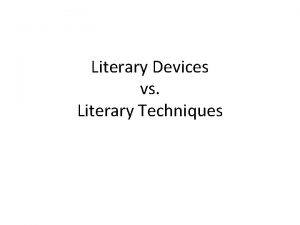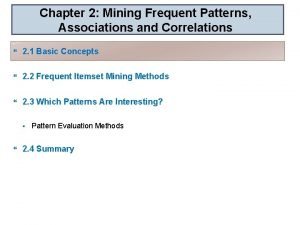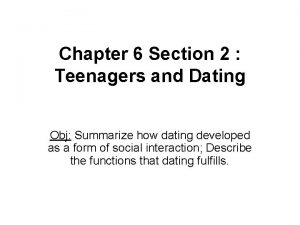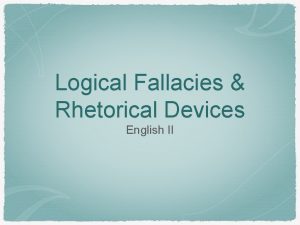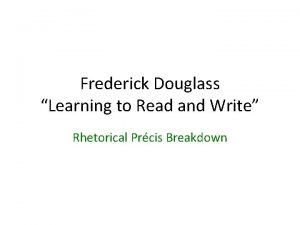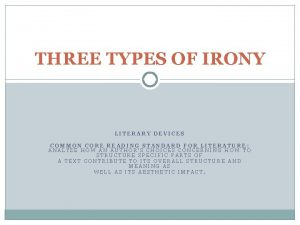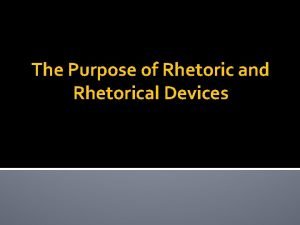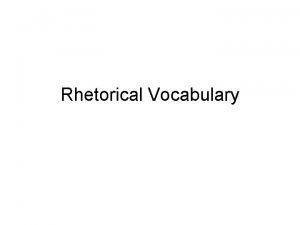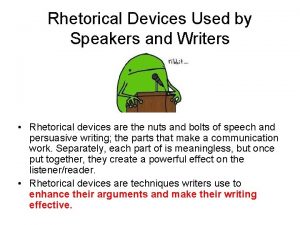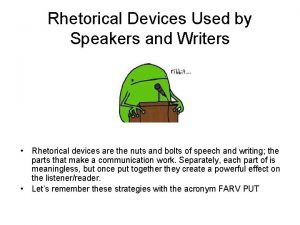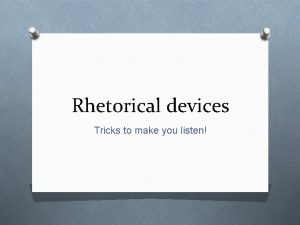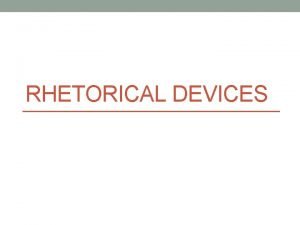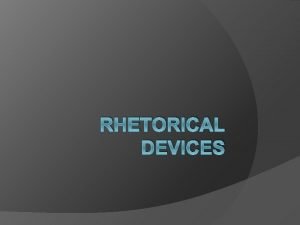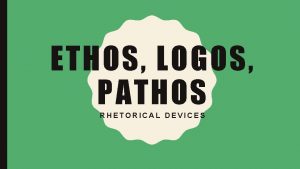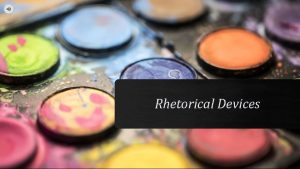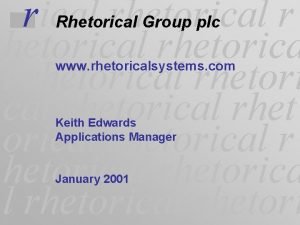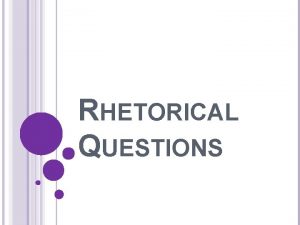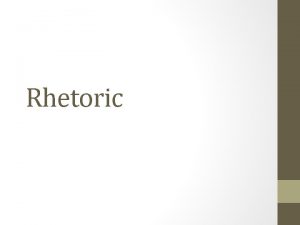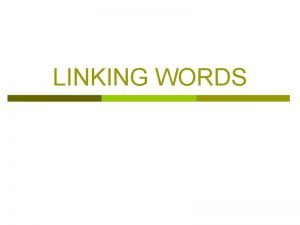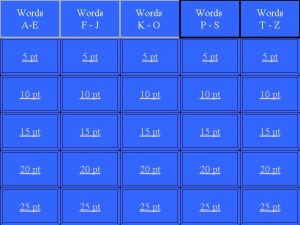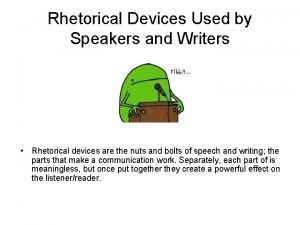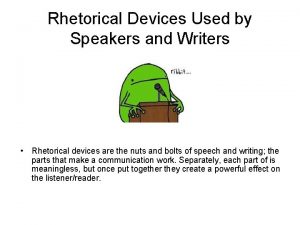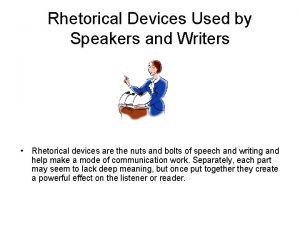RHETORICAL DEVICES Rhetorical Devices Patterns of words and

















- Slides: 17

RHETORICAL DEVICES

Rhetorical Devices • Patterns of words and ideas that create emphasis and stir emotions in the audience.

• Parallelism: repeating a grammatical structure or an arrangement of words to create a sense of rhythm and momentum. • Restatement: expressing the same idea in different words to clarify and stress key points • Repetition: expressing different ideas using the same words or images in order to reinforce concepts and unify the speech • Analogy: compares two things, which are alike in several respects, for the purpose of explaining or clarifying some unfamiliar or difficult idea or object by showing how the idea or object is similar to some familiar one. –Simile – Metaphor –Personification • Understatement: A figure of speech in which a writer or speaker deliberately makes a situation seem less important or serious than it is. • Allusion: reference another object (real or fictional) person, event, quote, or other work outside of the work of literature. Allusions can be shorthand for adding emotion or significance to a passage by drawing on the reader’s prior associations with the object. • Rhetorical questions : used to persuade or subtly influence the audience. It's a question asked not for the answer, but for the effect and to emphasize a point or just to get the audience thinking.

Parallelism • Repeating a grammatical structure or an arrangement of words to create a sense of rhythm and momentum. • “Ask not what your country can do for you —ask what you can do for your country. ”-JFK • “We make a living by what we get; we make a life by what we give. ” —Winston Churchill • “When the going gets tough, the tough get going. ”

Parallelism in FDR’s “First Inaugural Address” • “It can be helped by preventing realistically the tragedy of the growing through foreclosure of our small homes and farms. It can be helped by insistence that the Federal, State, and local governments act forthwith on the demand that their cost be drastically reduced. It can be helped by unifying of relief activities which today are often scattered, uneconomical, and unequal. It can be helped by national planning for and supervision of all forms of transportation and of communications and other utilities. ” • Helps emphasize his beliefs and enable speech to be read more smoothly • “… on honesty, on honor, on the sacredness of obligations, on faithful protection, on unselfish performance…” • Lists the ways in which confidence lives in American people, without confidence, there would be no motivation • Idea of cause and effect: motivation help people overcome low economic state • “…values have shrunken to fantastic levels; taxes have risen; our ability to pay has fallen…” • “It is the way to recovery. It is the immediate way. It is the strongest assurance” Adds emotion and tone

Repetition • Repetition expressing different ideas using the same words or images in order to reinforce concepts and unify the speech • “If you have an important point to make, don’t try to be subtle or clever. Use a pile driver. Hit the point once. Then come back and hit it again. Then hit it a third time – a tremendous whack. ” Winston Churchill • In other words…. say it loud and clear and again and…. yes, again.

Repetition in FDR’s “First Inaugural Address” • “The money changers have fled from their high seats in the temple of our civilization. We may now restore that temple to the ancient truths. ”


Restatement • Restatement expressing the same idea in different words to clarify and stress key points • “Slowly and grimly they advanced, not knowing what lay ahead, not knowing what they would find at the top of the hill, not knowing that they were so near to the outpost. ”

Restatement in FDR’s “First Inaugural Address” • “Nature still offers her bounty and human efforts have multiplied it. Plenty is at our doorstep, but a generous use of it languishes in the very sight of the supply. ”

Analogy • Compares two things, which are alike in several respects, for the purpose of explaining or clarifying some unfamiliar or difficult idea or object by showing how the idea or object is similar to some familiar one.

Analogy in FDR’s “First Inaugural Address” • “…the withered leaves of industrial enterprise lie on every side…” • “The money changers have fled from their high seats in the temple of our civilization. We may now restore that temple to the ancient truths”

Metaphors & Similes & Personification • …Must I?

In FDR’s speech • Personification: • “Nature still offers her bounty and humans have multiplied it” • “These dark days will be worth all they cost us if they teach us that our true destiny is not to be ministered unto but to minister ourselves and our fellow men. ” • Proves points and adds inspiration • Metaphor: • “emergence of war”; “lines of attack”; “armed strife”; “great army of our people”: “disciplined attack”; “wage a war”; “invaded by a foreign foe” • Strategically included these militaristic phrases to make the Great Depression seem like an enemy of war while uniting the people and giving them a reason to fight for a new economic freedom • “the withered leaves of industrial enterprise lie on every side. ” • Used to emphasize the circumstances that the American economy is facing; also serves to personify the troubles that American industry was going through…the industry of America is lying useless all over the place like withered leaves.

Allusions • “Yes, the moneychangers have fled from their high seats in the temple of our civilization” • Biblical allusion • Moneychangers in the Bible were thrown out by Jesus in order to restore the temple into a house of prayer • Shows the wrong that caused the Great Depression has been analyzed and uses the mistakes made in the past to restore everything and correct things for a better future • Convinces Americans to see the Great Depression in a positive way • “We are stricken by no plague of locusts” • Biblical allusion • In the Bible, God would send locusts to eat up the land cause destruction to the cities and nations that did not please him • FDR is trying to convince people the Great Depression is not God’s doing and to convince the people they can overcome together

Understatement • Deliberately expresses an idea as less important than it actually is, either for ironic emphasis or for politeness and tact. • “It was unkind of him to throw hot soup on his friend. ”

Rhetorical Questions • Rhetorical question is not answered by the author because its answer is obvious or obviously desired, and usually just a yes or no. • Rhetorical questions, though almost needless or meaningless, seem a basic need of daily language. Some common examples of rhetorical questions from daily life are as follows. • “Who knows? ” • “Are you stupid? ” • “Did you hear me? ” • “Why not? ” • Mostly, it is easy to spot a rhetorical question because of its position in the sentence. It occurs immediately after the comment made and states the opposite of it. The idea again is to make a point more prominent.
 All literay devices
All literay devices Eclat algorithm
Eclat algorithm Definition rhetorical mode
Definition rhetorical mode Dating serves several important functions that include
Dating serves several important functions that include Logical fallacies and rhetorical devices
Logical fallacies and rhetorical devices Learning to read and write frederick douglass
Learning to read and write frederick douglass Irony rhetorical definition
Irony rhetorical definition What is the purpose of rhetorical devices
What is the purpose of rhetorical devices Cicero rhetorical devices
Cicero rhetorical devices Repetition rhetorical devices
Repetition rhetorical devices Anaphora in patrick henry's speech
Anaphora in patrick henry's speech Rhetorical devices in art
Rhetorical devices in art Hypophora examples
Hypophora examples Tricolon sentence examples
Tricolon sentence examples Examples of rhetorical devices in i have a dream speech
Examples of rhetorical devices in i have a dream speech Stylistic device symbol
Stylistic device symbol Rhetorical.devices
Rhetorical.devices Parallelism definition literature
Parallelism definition literature
